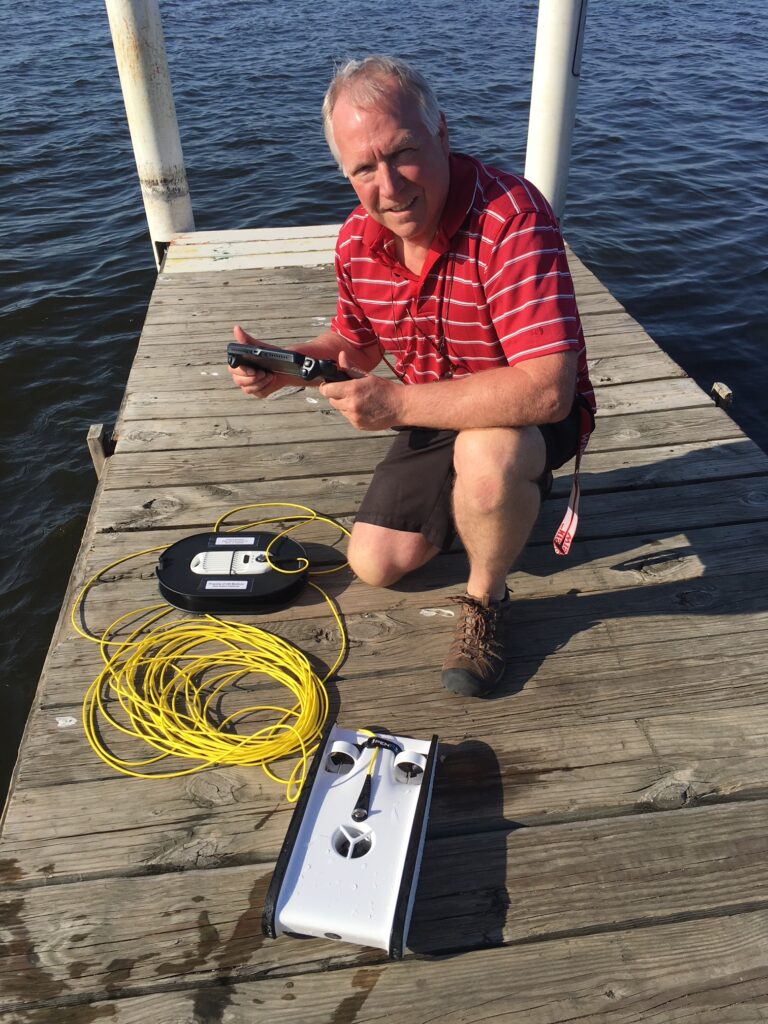Aquatic Sciences Center systems engineer James Grandt is a fixer.
“A lot of people don’t like problems,” said Grandt. “I like problems to solve. Give me something, I’ll figure it out.”

James “Frizby” Grandt kneels next to one of the remotely operated vehicles he assembled. Image credit: Wisconsin Sea Grant
Grandt, nicknamed “Frizby” for his love of disc golf and freestyle disc, retires in August after 25 years of service to the Aquatic Sciences Center and 36 total years to the University of Wisconsin–Madison. An Air Force veteran and electrical and computer engineer by training, he has worked on and fielded questions about the many technologies that help us do our jobs, from computer hardware and software to data storage systems and research instrumentation.
Notable projects include updating the conference room to touch panel controls, supporting the Grandparents University outreach program, and helping create the web version of the popular Wisconsin Fish ID app.
Grandt also worked to bring Great Lakes science and technology to the public. He assembled remotely operated vehicles (known as ROVs) that both children and adults use to take photos and video of underwater environments and a touch screen kiosk about aquatic invasive species that now lives at the Wisconsin Maritime Museum.
In short, if it’s got wires and goes through walls, if it’s got buttons and beeps and boops, Grandt will take a crack at it.
“That’s what I like about the job,” he said. “I don’t do the same thing every day. Always something different.”
Prior to the Aquatic Sciences Center, Grandt worked with the Department of Geoscience as an instrumentation specialist and helped develop a 4-channel digital sonar system to estimate how much biomass—or as Grandt describes it, “fish food and fish”—floated in the water column. He participated in research cruises on the Great Lakes, Gulf Stream and Bay of Fundy. One harrowing trip found him aboard a naval research ship in the Atlantic Ocean.
“We had lost propulsion in the Gulf Stream, and a large tropical storm was somewhere in the Atlantic,” said Grandt. Massive waves pounded the boat, stripping off equipment the crew had welded to the deck.
“Everything was gone when the storm was over. We rode it for 12 hours…but we survived.”
Risky voyages have been a theme throughout his life. When Grandt was 15, he and a friend biked 1,200 miles roundtrip from their home in Edgerton, Wisconsin to Thunder Bay, Canada. No helmets, no panniers—just two 10-speed bikes with a little bag to hold their tent and basic supplies. They camped at campgrounds and waysides, alternating who called home each night. They made the whole trip in around 14 days.
So, what’s next? Grandt has plans for an active retirement, one filled with travel (Vietnam and Thailand are already on the list), spending time with grandkids and getting outside. He enjoys canoeing, fishing, skiing and hiking—and may even return to Thunder Bay with his childhood friend, this time with a helmet and an e-bike.
After decades of fixing our problems, Frizby will leave us with one he can’t solve: we’ll miss him.


